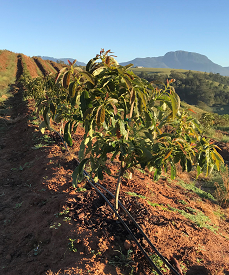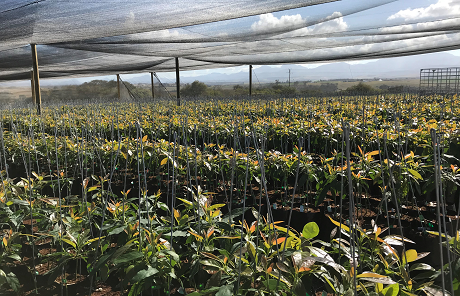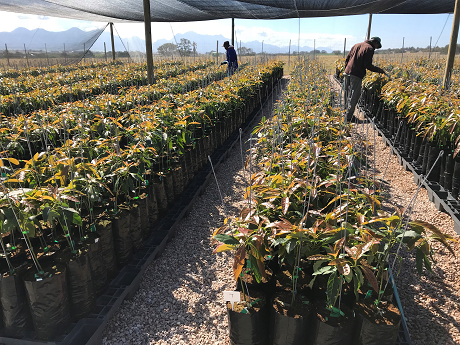 The temperate southern coast of the Western Cape stands on the cusp of a big avocado expansion, says Dr Guy Witney, independent agricultural consultant and avocado project manager for Moolman Farms, as the revenue potential of off-season avocados from late areas becomes clear.
The temperate southern coast of the Western Cape stands on the cusp of a big avocado expansion, says Dr Guy Witney, independent agricultural consultant and avocado project manager for Moolman Farms, as the revenue potential of off-season avocados from late areas becomes clear.
“A twelve month supply to the local market looks very attractive, and not only from a domestic point of view but also in terms of exports. If you can keep your sales desk busy and keep your brand on the retail shelf, you have a huge advantage on brands with a seasonal presence.”
“There is a lot of interest in the October to March window in avocado production,” he continues. “All of the major South African players are either already active in the Western Cape or running trials or are busy with feasibility studies. This is an important dairy region but many dairy farmers are looking to diversify.”
Just over a decade ago a few pioneers started looking at avocados in this area, which used to be at the centre of the country’s vegetable processing sector.
Western Cape avocado producers are currently harvesting Pinkertons and the Hass harvest is soon to start, just as the dominant northern regions are winding down (although there are reports of an ‘off-bloom’ crop, a small secondary crop). Reed and Gem avocados will start in the next few weeks, running until the end of December, depending on the summer temperatures. Lamb Hass could take them through to the end of January.
“Good quality off-season fruit will make a huge difference to the South African industry,” Dr Witney says. “Currently avocados from Spain and Israel are imported during this period and Israeli varieties just don’t hold up to ours, their growing conditions are very hot. Spain grows much the same varieties as we do but it’s a long voyage. With our exchange rate it’s terribly expensive to land that fruit and get it to market. I think more and more the domestic market will move to South African late avocados from high-lying areas in Limpopo, like Magoebaskloof, the Western Cape and parts of the Eastern Cape. There are a lot of hectares coming.”

A satellite nursery of Allesbeste Nursery, on Moolman Farms in George (Western Cape) (photo supplied by Dr Guy Witney)
“We could let Lamb Hass hang for 2 to 3 months after maturity”
KwaZulu-Natal, which traditionally brought up the rear of the South African avocado industry, is slightly earlier and their summers are significantly warmer than this part of the Western Cape. The result of the latter’s more temperate summer temperatures is that they can let their fruit hang longer, giving them a margin that would be the envy of many avocado growers. “On Lamb Hass I’m estimating that we could have a two or three month window after the fruit have reached maturity, but we can let it hang on the tree – it is a true late variety.”
He notes that fears of black spot on Fuerte because of the area’s periods of prolonged drizzle, deterring commercial plantings of the variety here, have thus far proved unfounded in trials.
Currently though, he says, many avocado producers in the Western Cape are sending their fruit to municipal markets, where there is still a residual depression on price after the record crop emanating from the northern areas. There are developments underway to develop the avocado processing sector in the Western Cape.

Allesbeste satellite nursery on Moolman Farms, George (photo supplied by Dr Guy Witney)
Bottleneck in avocado tree supply
Last year the area under avocados was estimated by the Western Cape Department of Agriculture at 135ha, a figure which has since more or less doubled, while the expansion plans of individual companies already exceed that. However, the availability of avocado trees is placing a damper on Cape expansion.
“The avocado industry is struggling to respond with sufficient trees to the planned expansion. There is no restriction on moving avocado trees across provincial borders, but on a truck you can stack avocado trees only one layer deep, because they’re tender and rub against each other during the journey, so on a large truck you can only transport about 3,000 avocado trees, as opposed to macadamia or citrus trees of which you could fit 7,000 or 8,000 on a truck.”
Microclones provide an answer to the transportation logistics of avocado trees, such as those produced at the Allesbeste Nursery in Tzaneen and grown on at their satellite nurseries, for instance the one between George and Groot-Brakrivier along the Cape’s south coast which will, it is planned, carry between 30,000 and 40,000 trees at full capacity.
“This will allow the expansion of the avocado industry in the Western Cape and relieve the current bottleneck. At the moment the nursery has 15,000 trees, all Maluma Hass, but it will also carry Reed and Lamb Hass. Gem will come through Westfalia’s nurseries because it is their cultivar.”
Access to US market “will be a very big deal”
Dr Witney has a particular interest in the US market, having spent a decade as director of industry affairs at the California Avocado Commission. “The US market consumes around 2.5 billion pounds of avocados. In fact, the annual increase of the US avocado market is more than the entire South African crop! When we get access to the US market it will be a very big deal, it would be fantastic. On the East Coast avocados obtain very good prices and it would be very lucrative for the South African industry.”
South Africa is also working on opening up the Indian and the Chinese markets for its avocados; the latter is the fastest expanding market for avocados, percentage-wise.
“We’ve just scratched the surface of consumer demand for avocados. I believe the Western Cape will be an up-and-coming area in avocado production and despite challenges like water availability, people will eventually carve out an industry here.”
